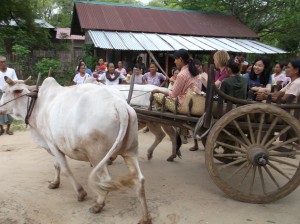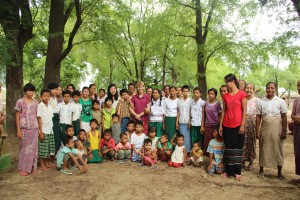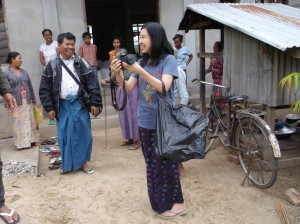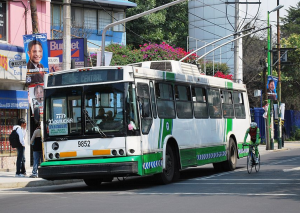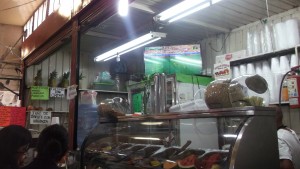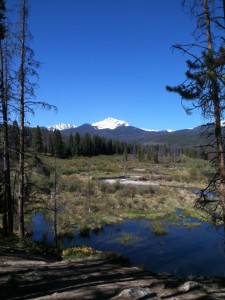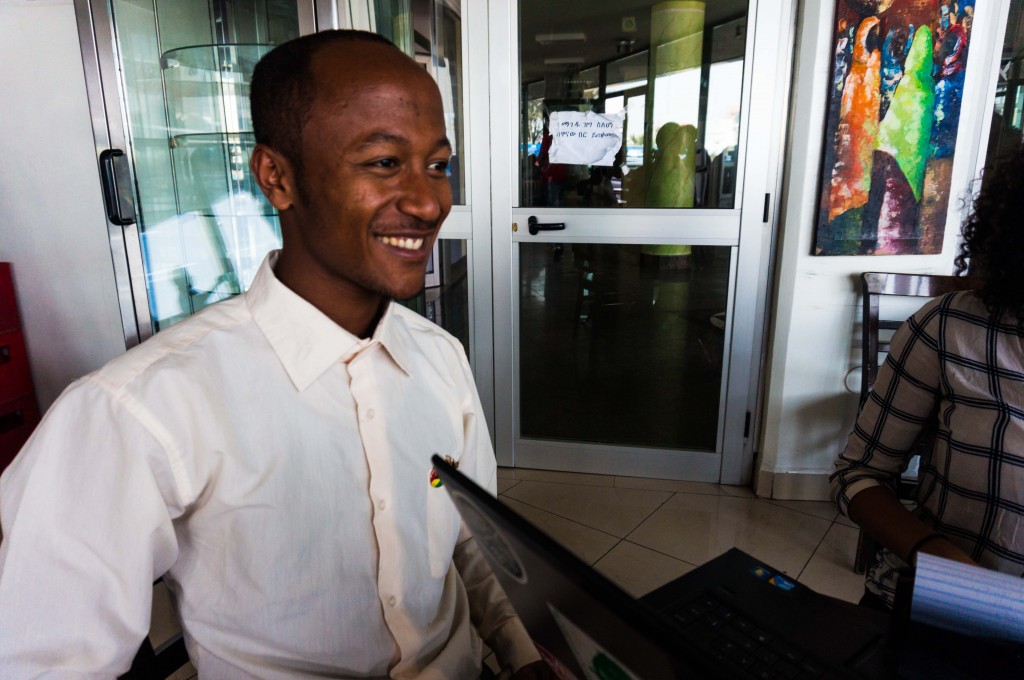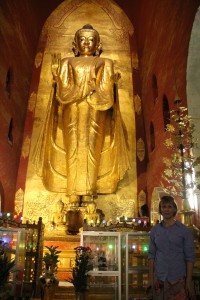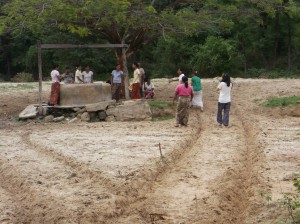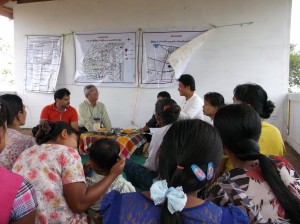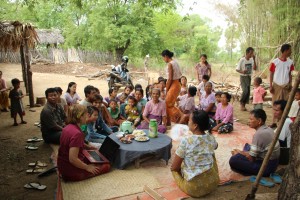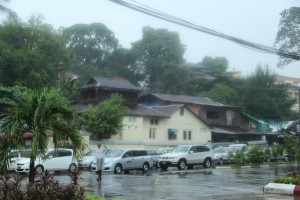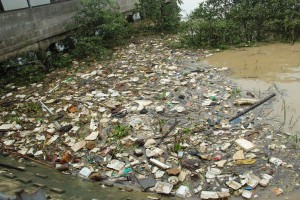Archive for June, 2014
Sharing a meal with my Mexican friends
Posted by Ainhoa Martinez in Ainhoa Martinez, Mexico on June 19, 2014
Since the very first moment I arrived to my home in Mexico City, I got on well with my rommates and I promised them I would cook Spanish omelette for them one day.
Well, it’s been almost 2 weeks since I landed here and it was time to prepare a nice dinner, so last night I was the chef.
The Spanish omelette is one of the most popular and tasty typical meals in Spain. I have to say I’m good at cooking and although desserts are my speciality, this time I wanted to share what my mum and granny taught me.
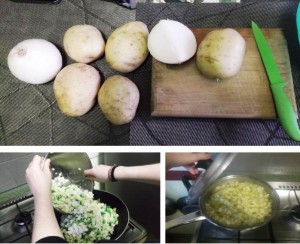
Cut the onions and the potatoes into small squares. Put some salt and fry them in the pan. Then, add some eggs, let it finish cooking and bon apettit.
I like sharing views, traditions and thoughts with people from other cultures. I am lucky I have been able to travel to different countries and have learned a lot from others.
Last night, Carina (one of my rommates) helped me preparing the dinner and we tried to add a Mexican ingredient to the Spanish receipe: the Nopal.
The Nopal is a plant grown in Mexico, with a lot of fiber and it tastes and looks like a pepper (more or less). The Spanish omelette with the Nopal was delicious.
A crucial moment while cooking a Spanish omelette is “the flip movement”. When the eggs are added and one side of the omelette is already cooked, but the other is not, you have to flip it. It can be difficult sometimes, but you can improve with practice.
At the end of the night we enjoyed a nice meal. Hugo and Carina (roommates) also prepared a lemon pie, which was exquisite.
Next time: Mexican spicy food (I hope I can stand the spicy).
A story of ‘we’
Posted by janine joyce in Burma, Janine Joyce on June 19, 2014
We have been welcomed by the dry zone.
We have listened and listened. The people have made sure that we have seen their struggle and know what is happening with the climate and in their lives.
I thought that we would be gathering stories from individuals but actually this story affects all equally. And so it has been a collective story that we have been hearing.
Over the last four days I have played with children, shared food, been shown the villages water ponds and wells, cuddled babies, seen the pumping systems, pulled water out of wells, and today travelled by bullock cart to see one of the ponds.
We have been walked around the farm land tracing the water ways and pond inlets and overspills…This has been a surprise to the farmers in the middle of the fields and also the dogs!
We have stood under the trees with the people getting wet in the rain.
All the villages have said that we have bought luck as after a long time; it has started to rain. It has rained wherever we have gone. I am so happy that it has. It is needed so much and the people don’t waste water. they really appreciate and make the most of it.
The rain has made it easier for me to listen to the stories. We have wet eyes enough without listening when no rain at all.
I am glad to be standing getting wet with people and laughing as we watch the herds of goats running to get home and into shelter. During the last four days in the field there has also been so much laughter and love.
The common message from people is how appreciative they are of the NGO’s that have been coming in and participating with strategies and water. projects. We have seen many wells ranging from 100 years old to new innovative ones.
We see simple ponds and much more developed reservoir systems. We sit with communities who have piped running water and those who must still carry the water by hand or with cows. Those that are in better situations help the others.
All have provided the physical labour for roads, buildings, water tanks, ponds… Each village have put funding into the projects alongside the NGO partners.
I feel really humbled by this level of collective vision and unity.
I never imagined that we would be sitting together with villagers like this.
Namsai has been sick since she came to Myanmar and yet she has remained really focused on the people. I am glad to be gathering stories with her.
Our first interview! Plus flooding, more flooding, and the World Cup.
Posted by Jessica Sanchez in Jessica Sanchez, Mexico on June 18, 2014
Yesterday, aside from early, the day was off to a rainy start. You see the weather in D.F. is unpredictable, so much so that its predictable. Every day will bring rain, overcast skies, a scorching sun and dry heat. That means pulling-off an outfit versatile enough to keep you cool, warm, and dry – every day. It’s actually become a joke between a friend and I, to see who’s outfit can make it through the day’s weather the best. I can’t complain, it’s really made me a pretty skilled dresser.
I digress, back to the beginning of the day. At 8:00 yesterday morning I took what locals call the “trolebus”, a public transportation bus that runs electrically off wires connected to poles throughout the city, to my partner Ainhoa’s place in Coyoacan.
At 9a a driver from CONAGUA, Mexico’s National Water Commission, picked us up and we traveled about 30 minutes crossing into Mexico City to CONAGUA’s facilities in Texcoco. As we drove out from D.F. we slowed numerous times due to flooding, even though the morning rainfall was light. This happens often. Anytime it rains, there’s flooding all over the city, causing major traffic jams and slowing public transportation, even the metro.
Though D.F. is notorious for it’s chaotic traffic, our drive was smooth and seeing as neither Ainhoa nor I get to travel by car much, we simply glared out the window, marveling at the size and diversity of the city. Crossing under bridges, past stadiums, colorful buildings, streets vendors and more, I sat silent, amazed by the many sites I had never seen.
At Texcoco, we learned about the origins of Mexico City and how its foundation was laid atop a body of water, which has plenty to do with the inundations that plague the city to this day. We then headed back to D.F. to another of CONAGUA’s facilities, where we finished there at around 1:45p. We headed back to Coyoacan with our driver anxious to drop us off to return and watch the Mexico v. Brazil game in the World Cup. We got dropped off near a market, where every restaurant, niche and stall had a television tuned into the game. There was plenty of emotion in the air, as the sounds of excitement or disappointment filled the market with every play.
What a time to be in Mexico.
Fallow Fellow Fumblings
From the relative comfort of my rocking chair in Boulder, smut novels and bon bons nestling with Medusa thoughts writhing about colorful balls of inertia in the bottom of my knitting basket, it is easy for me to flip the remote to the Self Pity Channel: “I wish I were on the ground doing good!”
I’m not battling taxi drivers, mosquitos and food poisoning. I am not bearing the haunted glances of parched children as flats of water bottles march by in perfect formation. I am not being immersed in the futility of promising initiatives that are smothered by corrupt politicians. I am not wending my way through imposing barriers while children are being rousted from their homes and neighborhoods on the pretext of crimes they did not commit.
I am luxuriating in hegemonic bliss as I await my opportunity to travel to another country to explore, learn about and tell the stories of others impacted by conflicts over one of the World’s arguably most precious resources: WATER! Yet I am gratified to learn that I am not totally divorced from the on-the-ground experiences of my fellow fellows. In fact, I have been repeatedly head butted by Phoenix’s friend, Serendipity, who found her way from Ethiopia to the foothills of the Rocky Mountains of Colorado.
I have become a veritable witching rod for all things water related. People off the streets run up to engage in random conversations about water quality. Folks in coffee shops bury me in literature about the various nefarious wanderings of water development through American history. Hay farmers crop up to share water adjudication and allocation woes. Human rights activists stop to commiserate about the loss of already limited arable reservation land to dam (damn?) projects.
All of this serendipitous water schooling (I swear, I have done and said nothing to invite this inadvertent education!) keeps pushing an uncomfortable thought to the forefront: Is my penchant for seeking out problems in other lands, a simple case of development myopia? I have been born, raised and educated in a cauldron of water issues, yet, up to this moment, have refused to see it. Am I the proverbial frog who has acclimated so steadily to this environment of conflict that she failed to note the transition from tepid to scalding?
Harrowing thoughts for a barren mind.
A visit to the Shuk
Posted by Lukas Matzkows in Lukas Matzkows, West Bank on June 18, 2014
With tensions still tangible in many parts of the West Bank, Ally and I spent the last few days in Jerusalem. After visiting a former prison, yesterday, we decided to do something more joyful today and finally paid our first visit to the local Shuk we had heard so much about. The Shuk or Sooq often is the commercial center of North African and Middle Eastern cities, here in Jerusalem it is the central market. The Mahane Yehuda Shuk near the new city center around Jaffa and Ben Yehuda Street has existed in various forms for more than a hundred years and is a place to shop for both Jerusalemites and tourists. It is a world of its own, consisting of a number of small streets and alleyways packed wit people and delicacies.
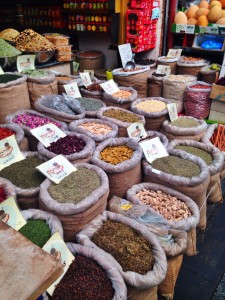

When we entered the roofed street of the market, we entered a beautiful place full of colors, smells and flavors. The market was full of people pushing through the narrow streets and we were overwhelmed by the variety of things on display. The smell of spices mixes with tea and fresh fruits and vegetables, while the ‘Halva King’ praises his latest creation. We wandered around the market for a couple of hours, only to take in the special atmosphere and in the end went home with some potatoes, fresh mint and lemons. There was just too much to chose from and we were not able to pick anything else from all these hundreds of stalls. Next time, that will be different.
My Friend, Serendipity
Posted by Phoenix McLaughlin in Ethiopia, Phoenix McLaughlin on June 18, 2014
We are starting to understand the transportation system, we are almost settled on housing, and we are starting to meet with useful contacts. We are still in the very early stages of the research process here in Addis, but the pieces are slowly but surely falling into place.
Of course, I should really emphasize the word “falling” in that phrase. I cannot say that I have been putting pieces into their rightful place, carefully selecting and arranging the parts of the puzzle into their respective slots, so much as tossing a bunch into the air and counting on some to land in the right spot. This has been true for finding housing and transportation (each search for a taxi is a roll of the dice) just as much as finding contacts for our project. We have made two solid contacts so far, and each one was an accident.
The first one was an American. The day after I arrived, I was going into my room at the hotel as he was leaving his. A little conversation began after exchanging courtesy greetings, and eventually I discovered he was in Ethiopia to help build a well in a rural village where water is very scarce. On top of showing me some good restaurants and teaching me how to use the minibus system, he said he could help Katie and I go to the village where he is working and interview the community leaders there about the water situation. An all-around good connection to make in the hotel hallway. (You can check out his NGO, Concordia Humana here)
Contact number two came from the housing search. When I came to visit the house where I am now staying, I met a young Ethiopian guy, Joel, who lived there and helped to manage the place. Lo and behold, he has helped out for a few years with a water NGO, Drop of Water, started by a group of Ethiopian women at the university in Mekele. After I looked around the place, he gave me the full story of the organization, slideshow and all, and it was immediately clear that it could be a great group to work with. Yesterday he arranged a meeting for Katie and I with the woman who runs the organization. It was an excellent meeting, short but sweet. We learned more about Drop of Water and made plans to interview them tomorrow and tag along to one of their field site visits in a couple weeks. (You should take a look at their website here)
We have emailed and called people in a concerted effort to make contacts, and we will email and call a lot more. The next week will be largely filled with us trying to make useful connections and purposefully putting those pieces into place. But so far, it can’t be denied that the most useful tool has been chance.
The rainy season in the dry zone…
Posted by janine joyce in Burma, Janine Joyce on June 17, 2014
The rainy season….
Well it is dry when it should be wet and the temperatures are souring above 40 degrees. The trees look parched, the land is brown and some of the river beds are dry. Where there is water, it is a mammoth engineering task to transport it to the famers. Who incidentally are often the women.
I have valued meeting the people and listening to their stories as they meet these challenges together. We all laugh when one of the women says this rainy season is already better than the last one… it has rained twice… That was yesterday and today.
We have sat for many hours today listening to several communities speak about the issues in their villages. And like it or not the biggest issue is water; sustainable access, quality and storage. As we sit under the roof cover of the communal meeting spaces the temperature soars. It is climate change at its most brutal, yet somehow we laugh, we listen compassionately, as we hear of strategies to engage with various developmental stakeholders. We hear stories of wonder and success as the people come together to meet the needs of survival. The trees are greener because people are protecting them and wells and dams are being built and refurbished. Some village people are replanting the trees as time is freed up from carrying water.
We have also spend time with several groups of women who are coming together to create shared livelihoods for their families. They are working hard to develop skills and produce saleable textiles. Again it is the lack of water that means that extra income is required away from the land.
Actually there is so much laughter when I share our purpose of meeting with them. One woman suggests that it would be helpful if I was a water medium. We all laugh and it is an interesting and unexpected ice breaker. I think, now is not the time to say that one of my cousins has great skills as a water diviner!
I am attracted to a four month old baby who happily snuggles into my arms for a cuddle. It is highlight to hold this baby and commune with his loving aunties as his mum worked.
Of course the Bagan area is breath-taking with over 2500 Buddhist Pagodas found by UNESCO and dating from the 9th Century. The people say that there are 500,000 Pagoda’s and therefore more to find. I am awestruck by the Ananda Pagoda, the oldest and most ‘significant’. The four Buddha’s are enormous in height and the alcoves where they are contained are repositories of peace and coolness. My heart is grateful and happy as we sit quietly in this ancient sacred space. A respite from the relentless dry.
Rainy days in Distrito Federal
Posted by Ainhoa Martinez in Ainhoa Martinez, Mexico on June 16, 2014
Climate is crazy almost everywhere and in Mexico City it will not be less than in other places.
We can feel 3 different seasons during a day: it is cold early in the morning, high temperatures and humidity when it gets to midday and almost every nightfall it rains.
There are some particular farmers in the Basque Country, who know a lot about climate change. I remmeber watching a documentary about their weather forcast when I was a child and I won’t never forget what they were explaining: “If the clouds are pretty bad, it means that something bad is coming. Its appearance is directly related to the climate that can change at any time”.
I was able to check that fact the other day when I went to take out the trash.
Thunder is heard, the clouds are pretty bad, it starts to get windy and temperatures drop.
You have to be careful when walking through the streets when heavy rain is coming, the traffic goes mad (normally it is crazy, so imagine if it is rainning) :
This is the road next to my home here in DF. My roommates and I were trying to cross the street after buying some pizzas in OXXO.
It was even worst at night. Electric storms joined the heavy rain:
What I usually do is to check the weather on the Internet in a website that tells you what is going to be the weather like hour by hour. However, I recently experienced it is not trustworthy.
Last week I left my umbrella at home and this was the result when I came back:
Lesson learned: bring always the umbrella in your bag, no matter if you know it is not going to rain that day, weather can suddenly change.
The Three ‘Annoyers’
Posted by Namsai Wongsaeree in Burma, Namsai Wongsaeree on June 16, 2014
Being here in Yangon I find three things rather annoying, and after training myself to look at things through the “water lens”, all these are somewhat related to water.
First, food poisoning. I haven been having constant food poisoning ever since I got here. Locating bathrooms has become the first thing I do when leaving our guesthouse. Janine, fortunately, have no problem with this. All we have been eating is hot meals and all have tasted and felt clean. I am starting to wonder if this is something to do with the water.
Second, mosquitoes. They are everywhere – from our humble guesthouse to a five-star hotel, from dawn to night. A westerner backpacker, also a medical student, we met while taking a circular train around Yangon, mentioned that he was taking pills to prevent Malaria. The presence of mosquitoes is not at all surprising when I saw water stagnation almost everywhere from the railway’s window…
Third, taxis. The fact that all the taxis drivers have been very friendly and helpful does not cancel out my annoyance of having to negotiate the price on every ride I am getting. Coming back in Myanmar this time, I was asked to pay almost twice the price I paid last week at the airport. I negotiated with several drivers and all of them insisted the same price. I got very upset at first thinking that I was being ripped off only to find out later that there was flooding in the city and it had taken them hours per trip.
“Water really is a big issue”. The sentence Janine and I keep repeating to each other…
The World Cup v. Mexico’s Energy Reform, 1:0
Posted by Jessica Sanchez in Jessica Sanchez, Mexico on June 15, 2014
As previously mentioned, I arrived in Distrito Federal roughly nine months ago in search of an understanding of the newly evolving Judiciary. It was not until the past few days, however, that I got the opportunity to observe a different side of the Mexican Government, its Legislature. With it, have come a few surprises.
This past week saw the beginning of discussions on energy reform initiatives for secondary laws presented by President Enrique Peña Nieto in April 2014. The Mexican Senate designated the job of discussing initiatives affecting 21 secondary laws to the Joint-Commissions on Energy and Legislative Studies. The objective of discussing these laws, some new and some amended, is to provide procedural regulations through which the implementation of the constitutional reform on energy may take place. Up to this point, the phrase “energy reform” might sound like a good thing. For those who might watch mainstream Spanish channels, they might be convinced of this. Unfortunately, this is far from reality. The novelty of President Pena Nieto’s reform is that it breaks the stand taken by President Lazaro Cardenas seventy-six years ago to nationalize Mexico’s oil industry. The reform effectively opens Mexico up to foreign investment, accompanied by exploitation of its land and natural resources, including its increasingly scarce fresh water supply. The biggest threat is what has been termed as “fracking”, a method of extracting natural gas from shale reserves deep in the earth’s subsoil. Invented by U.S. oil and gas giant Halliburton, fracking has spread throughout fifteen U.S. states with numerous “fraccidents” reported, and many vigilant states fighting to keep it out of their towns and away from their water sources.
I have taken the time to watch the Joint-Commissions, and observe, for the first time in my life, how the Mexican Legislature handles itself. I was also interested in watching the country’s primary parties, PRI (center), PAN (right wing), and PRD (left wing), along with others, discuss one of the most important reforms in Mexico’s history. I would never have anticipated what I’d see next.
The discussions began June 10 and quickly it was obvious that there was strife between the parties. On the one hand were PRI and PAN Senators. Holding the majority of votes, they sat smug, calm and collected, not to mention often distracted by their cell phones. I quickly felt put-off by their demeanor and condescending address of the issues. While their PRD counterparts, with the minority of votes, displayed themselves aggressive, wide-eyed and often highly offended. I’d never heard politicians speak so blatantly about the other party, and much less about the laws being discussed. It was an all-out soap-opera drama, live and on-air, and I mean that in a good way. The PRD Senators blamed the PRI and PAN for working together to approve initiatives that open Mexico up to a world of exploitation, to the detriment of the very people they’re suppose to represent. I was very surprised. I am not one who is very fond of politicians in general, but the PRD members’ candor, their well grounded oppositions, and most importantly their passion for the people they stand to represent, was moving.
In the last few days it has become obvious that PAN and PRI have little, if anything to change, much less discuss with regards to the initiatives proposed by the Executive. The reason for this and the PRD’s reactions became clear in media interviews, where a PAN Senator blatantly admitted PAN and PRI had already reached an 95% agreement on the initiatives, with the Executive, and without the opinion of PRD members. All before even having completed discussions on the first of four debates on the initiatives. In other words, the debate is not a debate. With the majority of votes held by PRI and PAN, they will continue to sit back and carry on with the discussions, but only for procedure’s sake. While PRD members can only carry out their arguments in hope that the Mexican people are watching and listening. Unfortunately, PRD lost the battle to have the discussions held after the World Cup. So chances are the majority of the country will be watching the scoreboard, with few listening to the warnings given by PRD about the dangers that loom with the energy reform. I can’t help but feel extremely disillusioned and disheartened by the discussions in the Joint-Commissions.
Though I am well aware of the corruption issues plaguing this country, the discussions display a level of disregard for the future of the country that leaves me truly astounded. If Mexico’s politicians are so readily available to sell out their country’s oil reserves for economic incentives, how can they be expected to protect the public’s right to it’s most fundamental resource – water?


